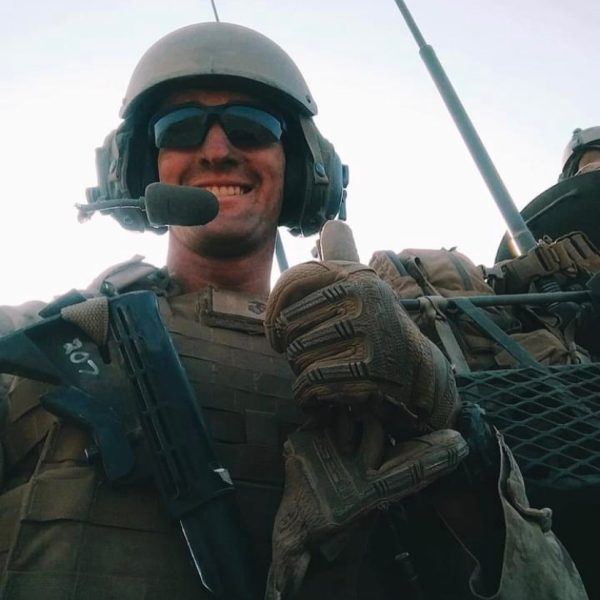WASHINGTON – During a May 2019 training exercise at Camp Pendleton in southern California, Marine 1st Lt. H. Conor McDowell of Chestertown, Maryland, was crushed to death when his light armored vehicle dove into a crevasse concealed by tall grass and rolled over.
Just 24 years old, McDowell recently had been promoted and was days away from being engaged to his girlfriend, Kathleen Borque.
The young Marine was one of 123 service members who died in similar tactical vehicle accidents between 2010 and 2019, according to a Government Accountability Office report.
Maryland Sens. Chris Van Hollen and Ben Cardin, both Democrats, have introduced legislation aimed at curbing such fatal accidents. Their proposed law would be named after McDowell.
The senators’ measure would create a pilot program requiring data recorders to be placed on Army and Marine Corps tactical vehicles.
“The goal of the pilot program is to improve safety both in training and in vehicle design in order to prevent unnecessary and tragic deaths,” Van Hollen told Capital News Service.
Additionally, the bill would require the Army and Marine Corps to use the data recorders to identify near accidents and other potential hazards that would otherwise go undetected.
The services also would be required to identify soldiers and Marines who needed more training in handling vehicles.
Michael McDowell, Conor’s father, said his son would be proud that the legislation is named in his honor, particularly because the family did not ask for that.
“But this can be his legacy and he can share it with the other young people, many in their teens, who were killed or maimed in preventable training fiascoes,” McDowell said. “We are so proud because it shows how much the country lost.”
“We remain committed to preventing needless loss of life during military training exercises,” Cardin told Capital News Service in a statement. “The DOD must focus its efforts on addressing this matter.”
Congress requested the report from the GAO, the nonpartisan auditing agency, regarding military vehicle accidents. The GAO concluded that there was a lack of consistency in training across the Army and Marine Corps, said Cary Russell, the GAO’s director for defense capabilities and management.
For example, some military units did not deal with speeding, while others did not enforce the wearing of seatbelts, Russell said.
Between October 2019 and July 2021, the GAO team conducted over 100 interviews at nine Army and Marine Corps training ranges to understand the context of safety issues, Russell said.
“It’s critical to get down and hear first-hand perspectives from the operators and the people living those programs,” he said. “You can only get so much at the command and headquarters levels….”
The GAO also found that there was a shortage of safety officers in Army and Marine units.
“By the time you get to a full-time safety officer in the Marine Corps, you’re talking about a division that has 22,000 Marines with only one safety officer covering them,” Russell said. “We thought that was a concern.”
Marine Capt. Andrew Wood, a spokesperson for the service, said in a statement to CNS that accidents “are investigated swiftly and thoroughly to identify and ensure appropriate corrective actions take place in order to prevent future occurrences.”
“Through improvements in our reporting culture and mechanisms, design and acquisition processes, training requirements, and information sharing with Department of Defense partners, the Marine Corps is making every effort to reduce the rate of mishaps,” Wood said.
The GAO report’s nine recommendations, all agreed to by the Department of Defense, include tracking driver proficiency and sharing information about potential hazards before, during and after training events. The recommendations are included in the Maryland senators’ bill.
Van Hollen said he would hold the Army and Marine Corps accountable in implementing the GAO report recommendations in a timely manner. But he added that the military needed a push by Congress when it came to outfitting tactical vehicles with data recorders.
Van Hollen expects the legislation will get bipartisan support.
“Right now we are proposing this as an amendment to the Senate to the National Defense Authorization bill,” Van Hollen said. “I have a pretty high degree of confidence that at the end of the day, this provision will be included in the National Defense Authorization Act….before the end of the year,” he said.
Rep. Anthony Brown, D-Upper Marlboro, introduced similar legislation that passed the House as part of its version of the National Defense Authorization Act for fiscal year 2022.
“Tactical vehicle accidents are preventable if we improve training and ensure a culture of safety within the Marines and Army,” Brown said. “This program establishing data recorders in tactical vehicles will help alert supervisors of potential lapses in safety, ensure accountability and empower our services to make better decisions when and if another accident occurs,” he said.
The Army and Marine Corps will be in charge of deploying the data recorders to four types of tactical vehicles, including the kind of light armored vehicle that McDowell was killed in.
“The bottom line here is we want to protect our troops, whether they’re on the battlefield overseas or whether their training for battle here at home,” Van Hollen said.
“My heart continues to go out to families still grieving the loss of their sons and daughters. We have a responsibility to them to prevent additional tragedies from occurring,” Brown said.
McDowell adamantly believes the implementation of safety measures in military vehicles will save the lives of service members and could have saved his son’s life.
“It does not bring him back, though,” he said. “That’s the hard part.”

